Ainao Farda Sanbato lays before us a bundle, wrapped in an old Israeli flag.
Slowly, with reverence, he spreads the flag and we see a collection of ancient, torn, dilapidated parchment pages, filled with dense writing in red and black, which has not faded in the slightest despite the many years.
His family members fail to hide their excitement.
In an apartment in a new building in the city of Lod, on the small living room table, under an impressive-sized TV screen, lies a centuries-old prayer book, passed down from generation to generation, and for decades lying on the floor of a church in a tiny village in northern Ethiopia.
Ainao breaks the silence: "The lost, historical treasure, has returned to us."
"Glow Number Corrections"
"The caseworkers, the rabbis of the community, used to read it when one reads and the other translates into Amharic."
The Book of Prayers, Photo: Yossi Zeliger
The adventures of Ainao Farda Sanbato (43), David Melsa Makoria (47) and Ghent Ashto Salem (53) in Ethiopia contain everything that a good story needs: three cousins who travel to the ends of the earth, find themselves fighting villagers who refuse to provide them with the lost book , Traveling on roads not roads - all to reach the good end.
"This book has been passed down from generation to generation within our family," says Ainao.
"It includes Psalms and bronze - special prayers of spiritual corrections imported from the Book of Zohar and Kabbalah. It is a very sacred book."
He flips through the book carefully, moving page after page, almost stroking it with his hands.
He lives in Rishon Lezion.
Married and father of two.
A former journalist and public figure known among members of the Ethiopian community.
In the last election, he was placed in eighth place on the list of the Religious Zionist Party for the Knesset.
This is not his first trip to Ethiopia.
Over these pages we scrolled almost two years ago how he brought, against all odds, the bones of his great-aunt to be buried in Israel.
But his childhood was spent far away from here, in a remote Jewish village called Weinreb, in the Dambia province of Ethiopia.
The three cousins, sons of three sisters, grew up together from a young age, surrounded by thousands of acres of farmland and overlooking the huge Lake Tana, the important water source of Ethiopia and Egypt, which supplies 80 percent of the Nile water.
"It was our grandmother, Tagba Dejan Garmai, who raised us, because our mothers were very young when we got married," says David, who now lives in Ashkelon and works for a pipe repair and disinfection system for drinking systems.
The book, they say, was one of a kind in the village and accompanied them throughout their childhood years.
Exactly when it was written, or where, they do not know how to say.
"He is at least a few hundred years old," they say, relying on being passed from father to son for years and years.
The National Library, which examined the book at the request of Shishvat, is believed to be about 200 years old.
"This is a book by the spiritual leaders called 'Mluxa,'" explains Gettant, a father of six who lives in Lod and works for the Airports Authority.
"These are Jewish monks, so the book was written in Gaz language - the language in which the Jewish holy books were written. It includes good virtues, prayers and 'Ardit' - which is part of the Kabbalah.
"In Ethiopia in those years, not everyone could read, not least in the Gazan script in which the book was written. Only the most senior clerics of Ethiopian Jewry knew how to decipher the letters and explain what was written in it. To Amharic. "
The book, which was rolled within the family, from village to village and from case to case, finally reached Moshe (Hanoch) Rada Arkshan, the grandfather of the three cousins, who died before they were born.
According to family tradition, Enoch was a descendant of a dynasty of spiritual leaders and the kingdom of the Gideons - a Jewish kingdom that ruled parts of Ethiopia for centuries.
"His nickname, 'Six', meaning 'shelter', was given to a grandfather by Jews he saved from abuse and mistreatment in the Balsa area. Enoch heard about what happened, went to the place and recognized the people who turned Jewish life into a nightmare. After introducing himself as a Jew they started teasing him, "Enoch, who was strong and tall, beat them with clubs. The Jews who suffered from the harassment joined him."
After Hanoch's death, his wife kept the book.
The grandfather's nephew, Penthon Bru, now 90 and living in Ashdod, used to read it on Saturdays and holidays.
"Grandpa's nephew is a genius and knows how to goose," says David. "Throughout our childhood, he was present around us."
"We ran away in the middle of the night"
The sisters Escobo, Addis (David's mother) and Tzeinshesh from Six Radha.
"They got married very young, and Grandma raised us,"
The years passed, and hard times came.
In the 1980s, civil war raged in Ethiopia, and the military junta imposed restrictions on all residents of the country.
Between 1988 and 1991, thousands of Jews left the villages in the north of the country, including the families of Ainao, Getnet and David, who arrived in the capital Addis Ababa pending immigration permits to Israel.
When the family members made the final preparations for their departure from the village for the last time, they faced a very difficult decision: they were forced to leave the holy book behind.
"We really wanted to get to Addis Ababa, but at that time it was very difficult for Ethiopian Jews to take property with them, certainly not such a big book," says David. .
"We ran away in the middle of the night so that they would not recognize that we were Jews," Ainaou adds, "it was impossible to take books with us."
The book was left behind, and the family set out on the long journey to Addis Ababa.
In 1991, as part of Operation Solomon, the three immigrated to Israel with their families.
The years passed and the large family members adapted to life in the country.
Weddings, births, work.
Life itself.
But the family treasure left behind is never forgotten.
"A few years after we immigrated to Israel, we started thinking about the book. We lashed out at it for leaving it behind, we wondered if it would be possible to bring it," says David. It's so important for the family, which has been passed down from generation to generation, but there was nothing to do. "
A few years ago another cousin of the three, Tesfahon in front of him from six, decided to take action - and went to Ethiopia.
He arrived in the village of Weinerv, but there he was bitterly disappointed.
Kabada, with whom the book remained, passed away, and his sons and grandsons flatly refused to cooperate.
"They evaded whenever Tesfahon asked to find out details about the book, and refused to give it to him."
After Tesfahun returned to Israel in despair, another cousin, Gubza Mollah Meshasha, tried to bring the book, but he was also disappointed.
The book seemed to be lost forever.
"The methods of Africa"
"We opened champagne."
Ainao and the book at Gondar Airport,
On the wall of Gattent's house hangs a painting of an IDF fighter, wearing a khaki uniform and wearing a beret.
Escobe from Six Rada, the mother of the two, is not in the health line.
So, when she turned to Ainao and asked him to try to locate the book again, he decided to respond to her and embark on an almost hopeless journey.
Escobo remembered how he had managed to bring her aunt's bones for burial in Israel, and she knew that if anyone could return the lost book to the family, it would be Ainao.
"A few months ago, Gattent's mother told me that she could not sleep, that she felt that her roots had been cut off and that she had to help her," says Ainao.
"Since Shai was killed she is not happy, and now she is not healthy either, so I felt I had to do it. I wanted to rekindle her joy. I knew she was not just asking for something like that."
David: "Escobo told us that if we could bring the book, it would be for her as if she was re-feeling her father."
Ainao turned to Gattent and David and harnessed them to the matter ("I told them it was worth making one more attempt").
He turned to contacts who had assisted him on his previous trip to Ethiopia, and began activating contacts to try to carry out the mission.
In March 2022, the three cousins set off.
"When we got to Ethiopia we tried to find a tip of the iceberg," Gattent says. The book, but we believed we would be able to convince them. "
The three traveled from village to village, on roads not roads.
In some villages the roads were bumpy, and could not be entered by cars, and they sent in their contact, Baylia Affark, riding a motorcycle.
The three did not enter the villages themselves, out of genuine fear that it was a danger.
“The situation there is very unstable,” David emphasizes, “locals are looking for people who have money, and if you see how you are dressed and find out you are from abroad, it can be dangerous.
"They can try to rob you or even murder you."
The breakthrough finally came from Kabada's son, the same son who vehemently refused to tell where the book was.
"The people who helped us took him to the city of Infriz, and held secret meetings with him there to persuade him to reveal to them the location of the book."
It's hard to describe Infriz as a real city.
With about 9,000 residents, a few mosques and churches, a school and shops, it serves as a sort of district town for the surrounding villages.
Although even in the Freeze most of the roads are not paved, there the villagers do their shopping.
The city has an extensive history with the Jewish world, as it was originally inhabited by members of the Beta Israel community, and it was even part of the kingdom of Gideon.
From the 16th century onwards, the place was ruled by the Christians, and until the 17th century it was located in the area of the city of Guzara, where the emperor Serza Dengel built a royal palace.
"We need to understand the methods of Africa," Ainaou explains. "We sent a son of Kabda people, and at first he did not want to tell. release".
Twice the cousins tried to persuade Kabada's son to find out the location of the book, but he refused.
The third time he broke.
"For the first time, after decades, we knew where the book was," says Ainao.
It turned out to three that after Kabda died, the book was turned into a priest in a local church in a village called Bo-la.
Baila entered the village and they began to grope.
The cousins received pictures of the book from the pastor, through Baylia, and through them saw it for the first time in 34 years.
It turned out he was in bad shape.
"They threw him somewhere on the floor, in the corner of the church. He was dismantled, they were not interested in anything," Getnet describes.
"The pages were a little torn, and he was not in good condition, but I recognized him immediately," adds David.
Despite the good news, the road to rescuing the book was still a long one and passed through the flexible laws and rules of Africa - and a great deal of money.
"The local priest initially demanded a lot of money from us," says Ainao, "to try to extract the book without paying, we consulted a lawyer and checked if the book could be demanded from him, but he said conclusive evidence was needed that it was indeed the book in question."
The cousins found themselves again facing a broken trough, "and then a miracle happened to us," Ainao admits.
While the pastor in his possession the book was delayed, our son became involved in crime.
"The priest's son shot someone and wounded him, and the authorities arrested the priest and demanded that he extradite his son. We recognized the opportunity, and sent our representatives to jail. We offered to pay for the money for the bail and bribe required to be released, and he agreed."
The amount finally paid was much lower than the price demanded by the priest, as he needed the money immediately.
The three, who were in Addis Ababa at the time, rushed to send Ainao on a direct flight to Gondar and from there by car to the village area, to quickly seize the opportunity.
In a video he sent to his cousins shortly after arriving in the village, Ainao is seen presenting a document signed by the priest, confirming the transfer of the book back to his family.
Baila handed him the book, wrapped in a white bag, and Ainao wrapped it in the Israeli flag - the same flag with which it is wrapped to this day.
"After many and not simple efforts, we were able to return Father Meshasha Rada's book to the family," Beila says in the video.
A few hours after he left Gondar, Ainao returned to Addis Ababa and possessed the lost treasure of his family.
The cousins hurried to send photocopies of the book to their elderly uncle, Pentagon Brew, to confirm that it was indeed the lost book.
When the long-awaited confirmation arrived, they did not know their souls.
"We were very excited, we celebrated, we opened champagne," Gettant recalls.
"All night we laughed and cried with excitement, we could not stop smiling, we were so happy. The book brought back so many memories for me. How we would gather all the children together and our uncle would call us. It was our connection to Judaism, our connection to Jerusalem."
Did you believe you would succeed?
David: "The truth is I had a hard time believing. It seemed like an impossible task. It was such a difficult journey, and it's unbelievable that we were able to do it."
The next day, David, Ainao and Gettant landed in Israel and hurried to bring the book to Escabot, Gettant's mother.
Ainao's mother, Tzheinesh, was told about the journey only at the end.
"She did not know I was flying, and only when we landed in Israel did I call her and let her know. She was silent for a few minutes, then burst into tears of joy. She told me a sentence I had never heard from her: 'I am proud and happy that you are my son. You surprise me every time. '".
"Ready for the task"
The National Library has offered the three to keep the book on display, but the family is interested in continuing the tradition and educating their children in light of it, and the book is currently in Ainao's home.
Among other things, the family is considering restoring the book, at a cost of tens of thousands of shekels, and later perhaps translating it through cases into Amharic and Hebrew.
"We feel like a lost, historic treasure is coming back to us," Ainaou says.
"My 12-year-old son wanted to keep the book. I gave it to him, and I explained to him that his great-grandfather would pray with him. We want the community to continue praying with the book, not to be in a museum. Jews for all intents and purposes, and this book is eternal proof of that. "
Ainao and his cousins are not going to stop here.
"There are a lot of books like this, taken by the Ethiopian Church, which to this day try to obscure the Jewish history of Ethiopia," they say. In Israel. "
hanangreenwood@gmail.com
Were we wrong?
Fixed!
If you found an error in the article, we'll be happy for you to share it with us

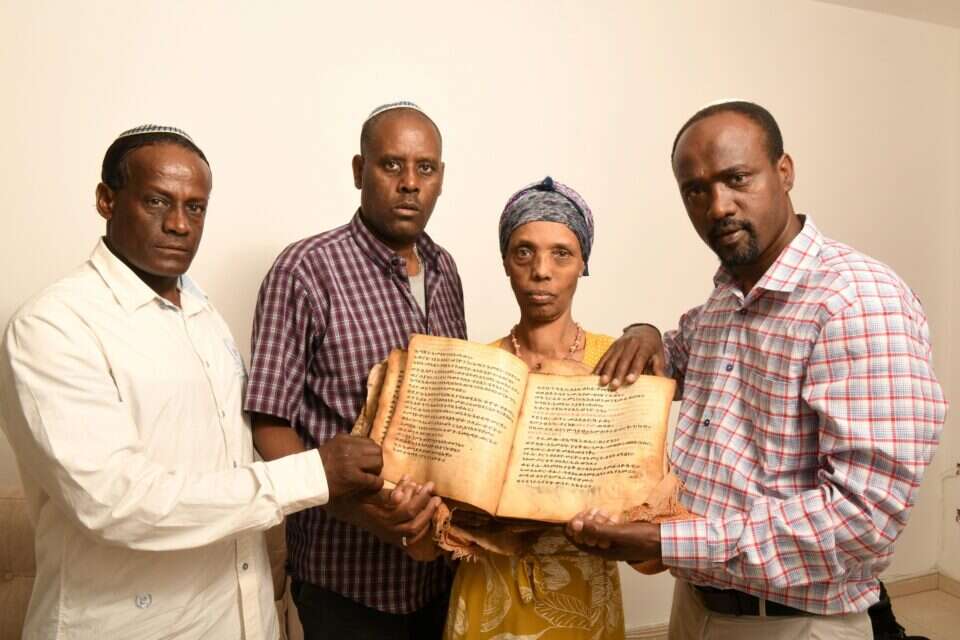
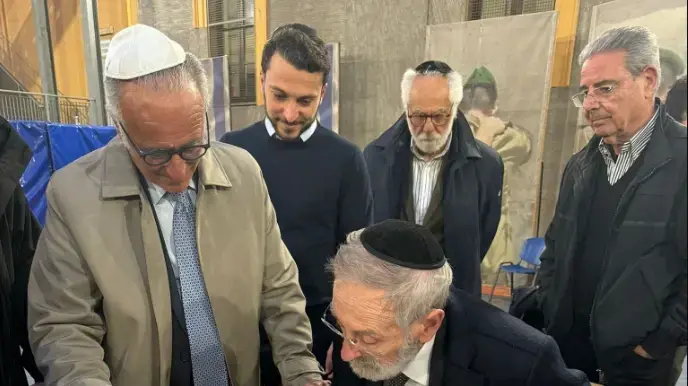
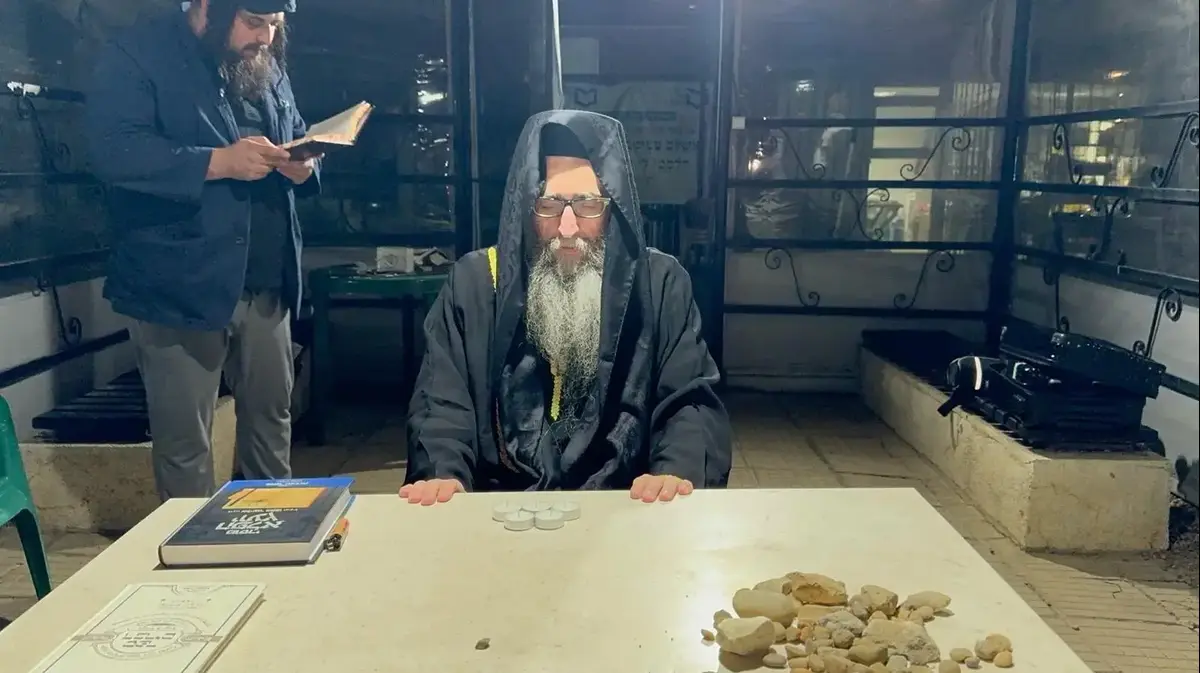
/cloudfront-eu-central-1.images.arcpublishing.com/prisa/DGKSYYSAUBHLZJJTPYM7TMTCWM.jpg)
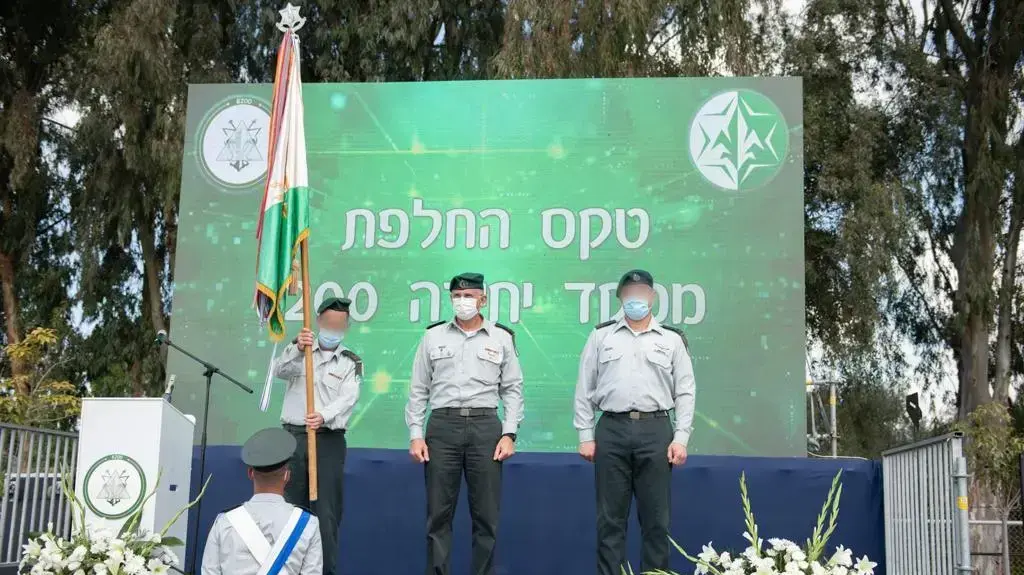
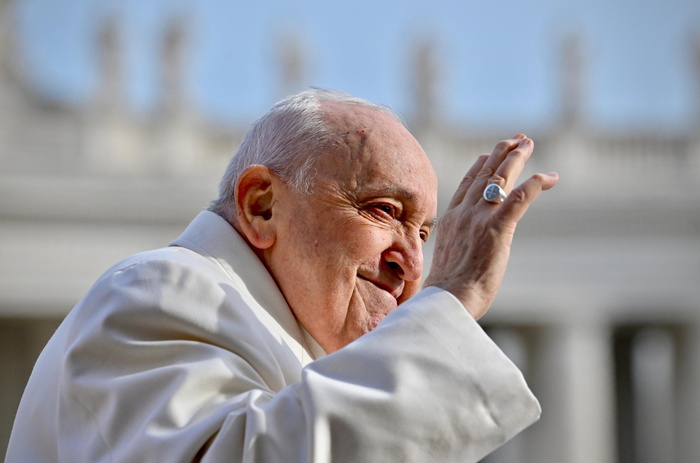
/cloudfront-eu-central-1.images.arcpublishing.com/prisa/ZOCMVORHQFDZLLB5JILHA3BWWQ.jpg)

